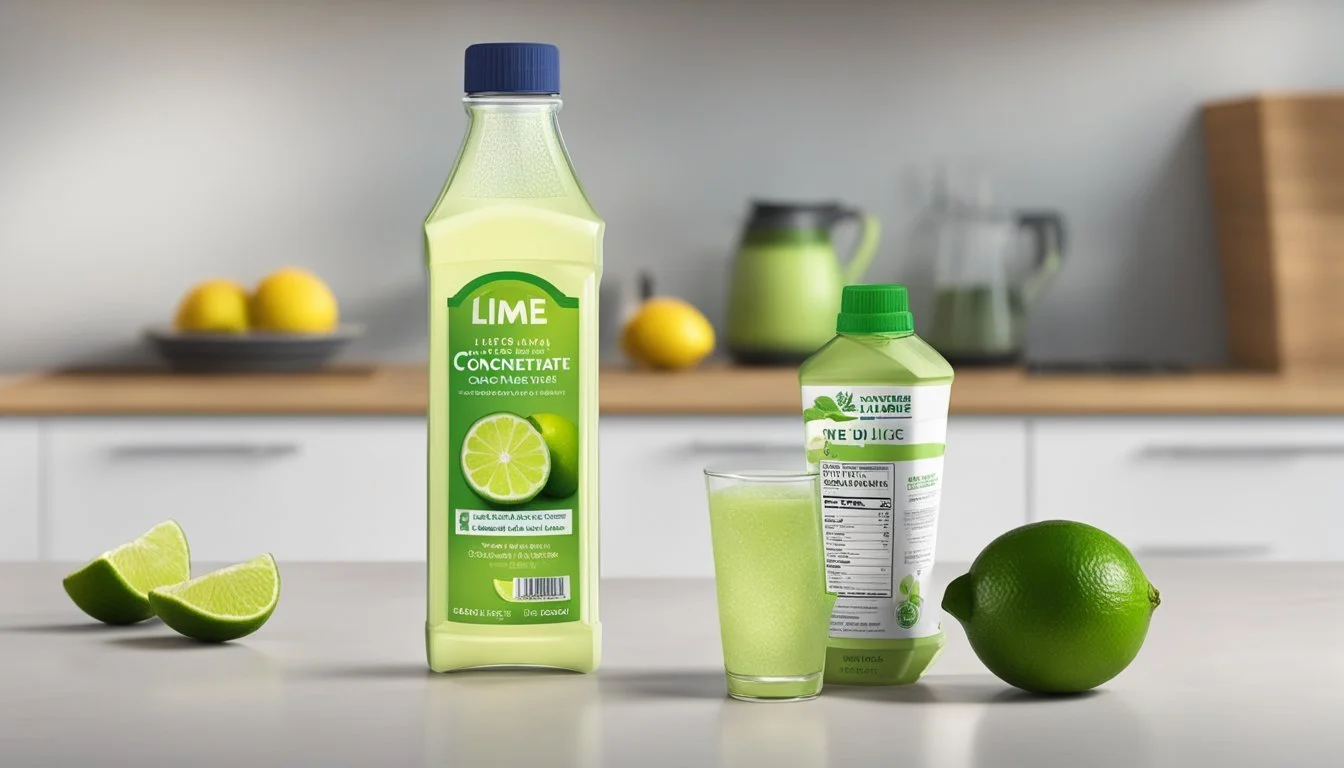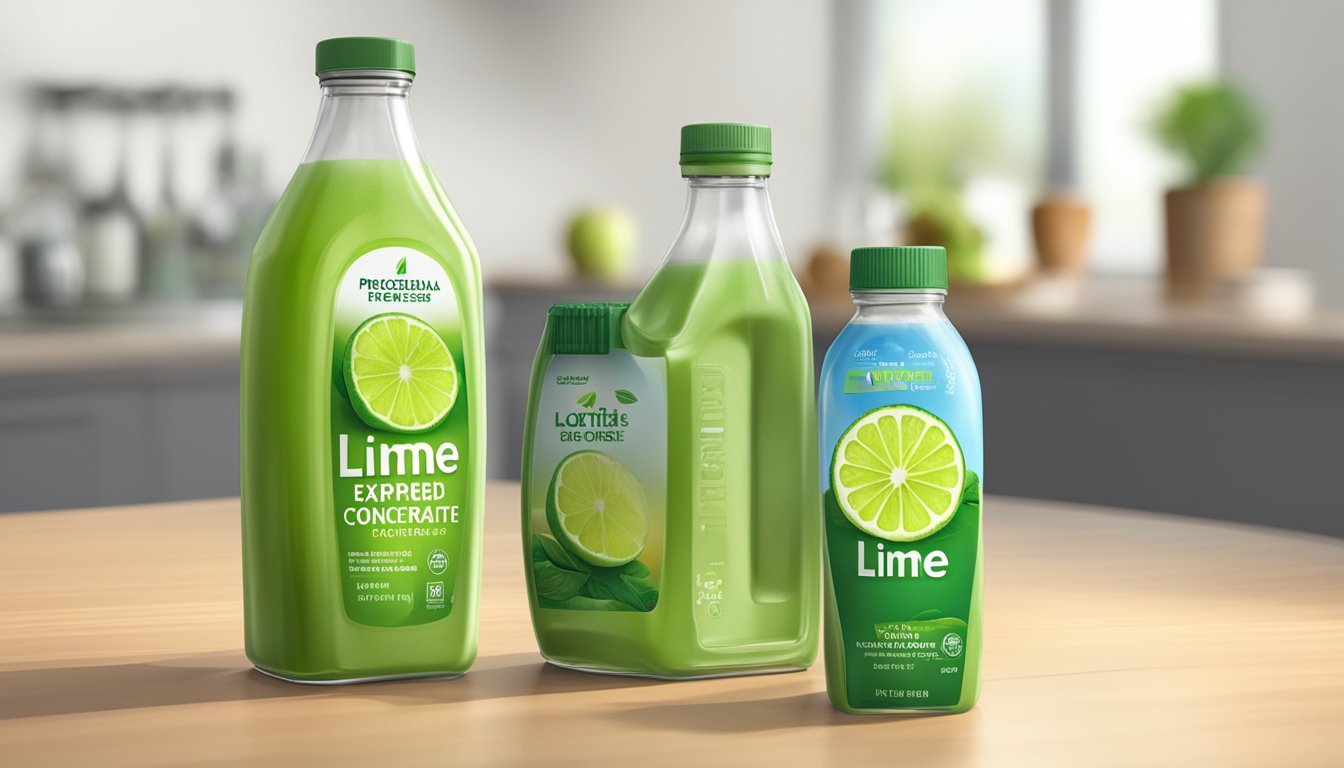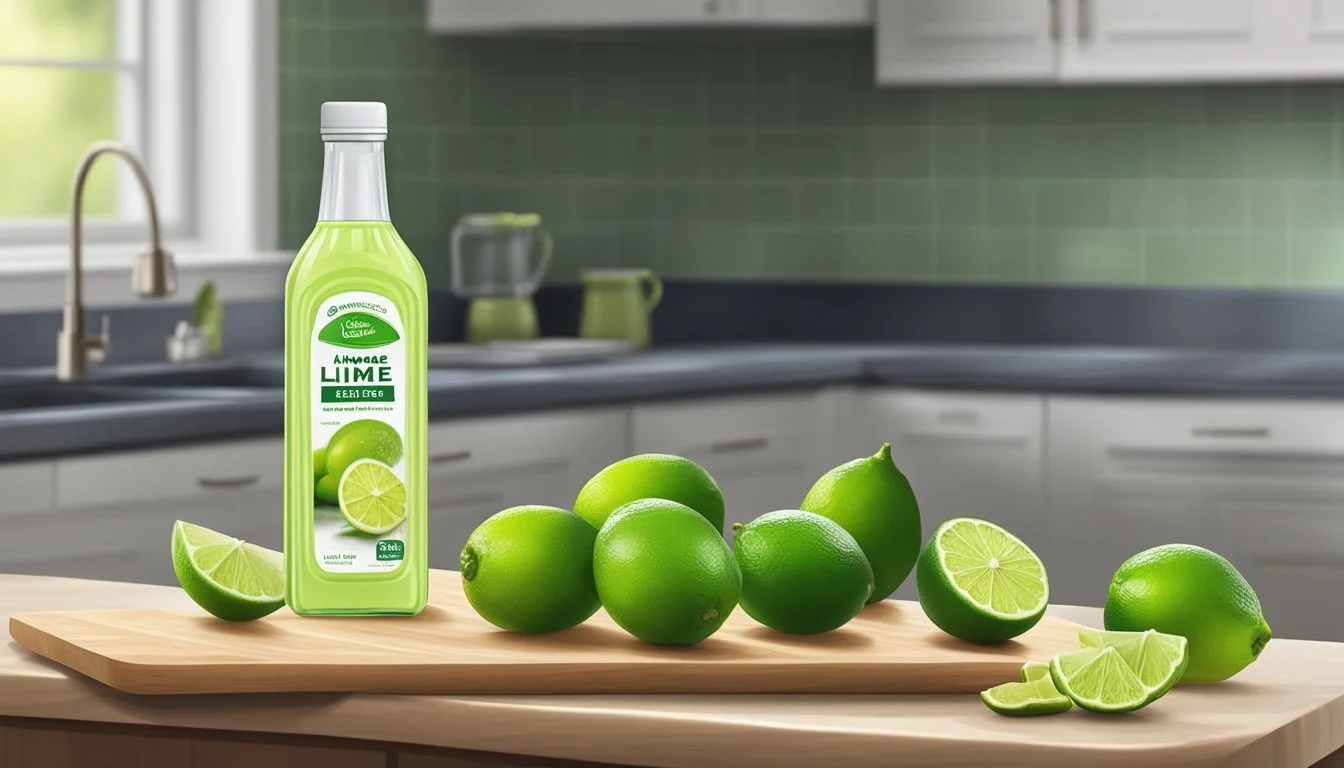Is it Safe to Use Expired Lime Juice Concentrate?
Unveiling the Facts about Shelf Life and Quality
When considering the safety of using expired lime juice concentrate, it is crucial to understand the characteristics of lime juice and the implications of its expiration. Lime juice, particularly in its concentrated form, is a versatile ingredient known for adding a zesty flavor to food and drinks while also providing a notable amount of vitamin C. Its acidic nature does extend its shelf life compared to other juices, but like all perishable items, lime juice concentrate will eventually go bad.
The expiration of lime juice concentrate signifies the end of its guaranteed peak quality as determined by the manufacturer, and it is not an instantaneous switch from safe to unsafe. Often, the juice may still be usable beyond this date, especially if unopened and stored properly. However, it is important to be attentive to any signs of spoilage, such as an off smell, an unusual taste, or cloudiness, as these are clear indicators that the concentrate should not be consumed.
Safety is paramount when it comes to ingesting any expired product. While consuming a slightly past-date lime juice concentrate may not always lead to foodborne illness, the risk increases as time goes on past the expiration date. Proper storage, which typically involves keeping the lime juice concentrate refrigerated after opening, can preserve its quality for a while, possibly extending its usability past the expiration date. However, for ultimate safety and quality, it is advisable to adhere to the recommended shelf life and storage instructions provided by the manufacturer.
Understanding Lime Juice and Its Properties
Lime juice, whether fresh or concentrated, is a commonly used ingredient popular for its acidic properties and flavor. This section will explore the components that give lime juice its characteristics and how these differ in freshly squeezed juice versus concentrate.
Composition and Preservation
Lime juice contains high levels of vitamin C, which acts not only as a nutrient but also as a natural preservative that can prolong the shelf life of the juice. The primary constituents of lime juice include water, citric acid, natural sugars, and other organic compounds that contribute to its unique tart flavor profile.
For preservation, bottled lime juice often contains added preservatives to extend its shelf life. These may include substances such as sodium benzoate or potassium sorbate, which inhibit the growth of mold and bacteria. Pasteurized lime juice has been heat-treated to kill bacteria and prolong shelf life, while commercially processed lime juice is treated and packaged to be shelf-stable for months or years under proper storage conditions.
Freshly Squeezed vs. Concentrate
Freshly squeezed lime juice is extracted directly from the fruit without any additives. It offers the most natural and potent flavor but has a shorter shelf life due to the absence of preservatives. Because it is not pasteurized, freshly squeezed juice should be used within a few days when stored in a refrigerator.
On the other hand, lime juice concentrate is manufactured by removing water from the juice to extend its longevity. This makes it highly portable and convenient for storage. Once water is added back to the concentrate, it can be used similarly to freshly squeezed juice. However, the flavor may differ slightly due to the concentration process and the potential addition of preservatives. Bottled lime juice concentrate typically includes a best-by date and can last from 6 to 12 months when stored unopened in a cool, dark place. Once opened, it should ideally be consumed within a shorter timeframe, typically three months, and requires refrigeration to maintain quality.
Safety Concerns with Expired Lime Juice
Using expired lime juice concentrate can pose health risks, particularly as it becomes a breeding ground for bacterial growth, leading to spoilage and potential food poisoning. It is crucial to recognize the signs of spoilage and understand the risks associated with consumption to ensure food safety.
Food Poisoning and Bacterial Growth
When lime juice concentrate expires, it becomes susceptible to bacterial growth, including pathogens that can cause food poisoning. These bacteria thrive in moist environments and can rapidly multiply in expired juice. Consumption of such contaminated juice can result in symptoms like nausea, vomiting, diarrhea, and stomach pain. To mitigate health risks, it’s essential to adhere to expiration dates and proper storage techniques to minimize bacterial contamination.
Signs of Spoilage and Contamination
Identifying spoilage in expired lime juice concentrate involves observing certain signs of spoilage:
Off-color: Any discolored appearance could indicate spoilage.
Foul odor: An unpleasant smell is a strong indicator the lime juice is no longer safe to consume.
Mold: Visible mold growth is a clear sign of contamination.
Change in taste: A sour or otherwise off taste is a hint that the lime juice should not be used.
Additionally, cross-contamination can occur if expired lime juice is used, spreading bacteria to other foods and surfaces. To maintain food safety, always inspect the concentrate for these signs and err on the side of caution, discarding any juice that shows signs of spoilage.
Impact of Expiration on Quality and Flavor
When lime juice concentrate passes its expiration date, its quality and flavor can deteriorate. Specific changes in taste, smell, appearance, and consistency can indicate that the product is no longer at its best.
Changes in Taste
The zesty and tangy flavors of lime juice concentrate are expected to diminish over time, especially after the expiration date. Consumers may notice a loss of the sharp, citrus flavor that is characteristic of fresh lime juice. The once bright and acidic taste may become dull and less pronounced, signaling a decrease in the quality of the product.
Changes in Smell and Appearance
Lime juice concentrate's fresh aroma can change, becoming less fragrant and possibly developing an off-odor as it expires. The smell is a strong indicator of the overall freshness. In terms of appearance, a change in color could occur, with the juice becoming darker or murkier. These visual and olfactory cues can suggest that the lime juice concentrate is past its prime.
Texture and Consistency Alterations
Oxidation may affect the texture and consistency of expired lime juice concentrate. The liquid might thicken or become slightly more viscous than when it was fresh, and separation may occur. It is essential to shake the bottle before use if visual changes are present, although this may not restore the original quality of the product.
Best Practices for Storing Lime Juice
Proper storage conditions for lime juice concentrate are essential for maintaining its quality and extending its shelf life. Following specific guidelines ensures the lime juice remains safe for consumption and retains its optimal flavor.
Ideal Storage Conditions
Lime juice should be stored in a cool, dry place away from direct sunlight. Store-bought lime juice often comes in containers that are best kept at room temperature until opened. Once the seal is broken, it should be transferred to the refrigerator to maintain a consistent, low temperature.
Maximizing Shelf Life
After opening, store lime juice in a tightly sealed container to prevent exposure to the air, which can accelerate degradation. When refrigerated, properly stored lime juice can have an extended shelf life. Check the expiration date on store-bought lime juice for the best use-by guidance, and consume refrigerated lime juice within a recommended time frame—typically within a week for fresh lime juice or up to three months for bottled varieties.
The Freeze Option
For long-term storage, freezing lime juice is an effective method. Pour the lime juice into ice cube trays to freeze in small, usable portions. Once frozen, transfer the cubes to a freezer-safe airtight container or resealable bag. This prevents freezer burn and flavor transfer from other foods. Lime juice stored this way can be used for several months and is easily thawed as needed for recipes or beverages.
Deciphering Expiration and Best-By Dates
When it comes to lime juice concentrate, understanding the distinction between expiration dates and best-by dates is crucial for both safety and quality.
Legal and Regulatory Aspects
Regulations on date labeling of food products, including lime juice concentrate, vary by jurisdiction. In the United States, there is no federal mandate for placing expiration dates on food, except for infant formula. The expiration date indicates the end of the period during which the product is at its peak quality as determined by the manufacturer.
Expiration Date: Strongly advised not to use the product beyond this point.
Interpreting Date Labels on Products
Consumers often encounter various date labels on products such as lime juice concentrate:
Best-By Date: Refers to the date recommended for the product to be used while at best quality. It is not a safety-related deadline.
Label Type Meaning for Lime Juice Concentrate Best-By Date The manufacturer's estimate for peak quality. Expiration Date The product should not be consumed post this date.
Best quality implies that the lime juice concentrate will have optimal flavor and nutritional value if used by the best-by date; however, it may still be safe to consume after this date if it has been stored properly and shows no signs of spoilage. The best before date serves as a suggestion for when the product will be at peak freshness, without implying that it becomes unsafe shortly thereafter.
Alternatives to Using Expired Lime Juice
When faced with expired lime juice concentrate, consumers have safer alternatives that ensure freshness and quality. Crafting homemade concentrate or utilizing leftover lime juice are practical options that sidestep potential risks associated with expired products.
Creating Homemade Lime Juice Concentrate
One can prepare homemade lime juice concentrate by simply squeezing fresh limes. This not only guarantees freshness but also provides control over its storage life. To make a concentrate, they should:
Squeeze the juice from fresh limes using a juicer or by hand
Strain to remove seeds and pulp
Optionally, reduce the juice on low heat to thicken it, increasing its shelf life when stored in the freezer
Storage tip: Keeping the homemade concentrate in an airtight container in the freezer will prolong its usability significantly, often up to four months.
Utilizing Leftover Lime Juice
Should there be any leftover lime juice—perhaps from a recent grocery trip or unused produce—one can employ it instead of the expired concentrate. Here's how:
Immediately store any unused, freshly squeezed juice in the refrigerator, not at room temperature.
Use ice cube trays to freeze the leftover juice in small portions, creating convenient amounts for later use.
By following these methods, consumers can easily substitute expired lime juice concentrate, maintaining the quality and safety of their dishes and beverages.
Sensory Evaluation and Testing
When assessing whether expired lime juice concentrate is safe to use, sensory evaluation is a reliable approach. This evaluation primarily involves smell and taste tests to detect any signs of spoilage.
Conducting a Smell Test
One initiates the evaluation of lime juice concentrate by conducting a smell test. The individual should uncap the container and take a cautious whiff of the concentrate. Healthy lime juice concentrate typically has a fresh, citrusy smell. If an individual detects bad smells or offensive odors, the product may have spoiled. Such odors could range from sourness indicative of fermentation to a moldy scent if microbial growth has occurred.
Taste Test Methodology
Should the lime juice concentrate pass the smell test, one proceeds to the taste test. It is crucial to only taste a very small amount on the tip of the tongue, as consuming larger quantities of potentially spoiled juice is risky. The concentrate should have a tart but not unpleasant flavor. Any signs of a significant deviation from the expected tangy taste could suggest spoilage. If strange flavors are present or the acidity has significantly lessened, it's best to err on the side of caution and discard the juice.
The Role of Lime Juice in Culinary Applications
Lime juice, with its high acidity and bold citrus flavor, plays a vital role in enhancing the flavor profile of various dishes and beverages. This component is critical in both traditional and innovative culinary practices.
Flavor Enhancements in Food and Beverages
Lime juice introduces a tangy and refreshing flavor that can transform the taste dynamics of food. Chefs often use it to add zing to marinades, dressings, and sauces, balancing the flavors and cutting through the richness of fats. Due to its high citric acid content, lime juice can also act as a meat tenderizer, altering the texture of proteins for a more palatable experience.
Key benefits in culinary applications:
Flavor balance: Adds a sharp contrast in savory and sweet dishes.
Tenderness: Breaks down proteins in meats.
Freshness: Imparts a refreshing tang to food and non-alcoholic beverages.
Using Lime Juice in Cocktails
In the realm of mixology, lime juice is indispensable for curating a wide array of cocktails. Its ability to inject a vibrant tang and citrusy punch is unparalleled and acts as a foundation for classics like Margaritas and Mojitos. Bartenders value lime juice for its consistency in acidity, which is essential for maintaining the delicate balance in cocktails.
Essential cocktails with lime juice:
Margarita: Lime juice is key in this tequila-based favorite.
Mojito: Adds freshness to this mint-infused rum cocktail.
Gimlet: Lime juice mixed with gin for a simple yet potent drink.
Through proper use, lime juice serves as a core element in both the culinary and beverage world, delivering a distinct and sought-after tangy zest.
Frequently Asked Questions
When it comes to the shelf life and safety of lime juice concentrate, consumers commonly have several questions. The following are clear, factual answers to these frequently asked questions.
How Long Does Lime Juice Last Before It Expires?
Unopened lime juice concentrate generally has a shelf life of 18 months to 2 years, depending on the brand and storage conditions. It should be stored in a cool, dark place to maximize its lifespan. Once opened, lime juice should be kept in the refrigerator and ideally used within six months.
Is It Ever Safe to Consume Expired Lime Juice?
Consuming expired lime juice concentrate is not recommended. Over time, it can develop harmful bacteria or mold. Any discoloration, cloudiness, or off smell is a clear indicator that the lime juice is no longer safe to consume. Using juice past its expiration date can lead to foodborne illnesses.
Preventing Lime Juice Spoilage
To prevent spoilage, store lime juice in the refrigerator immediately after opening and keep the container tightly sealed. Avoiding exposure to heat and direct sunlight also helps maintain quality. Indeed, correct storage is paramount in extending the usable life of lime juice concentrate and keeping it safe for consumption.










